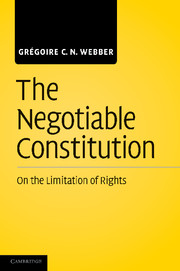Book contents
- Frontmatter
- Contents
- Preface and acknowledgements
- Introduction: on the limitation of rights
- 1 The constitution as activity
- 2 The received approach to the limitation of rights
- 3 Challenging the age of balancing
- 4 Constituting rights by limitation
- 5 The democratic activity of limiting rights
- 6 Justifying rights in a free and democratic society
- Conclusion
- Bibliography
- Index
3 - Challenging the age of balancing
Published online by Cambridge University Press: 30 March 2010
- Frontmatter
- Contents
- Preface and acknowledgements
- Introduction: on the limitation of rights
- 1 The constitution as activity
- 2 The received approach to the limitation of rights
- 3 Challenging the age of balancing
- 4 Constituting rights by limitation
- 5 The democratic activity of limiting rights
- 6 Justifying rights in a free and democratic society
- Conclusion
- Bibliography
- Index
Summary
Introduction
The ‘image of balance’, Carl Schmitt tells us, ‘can be found in every aspect of intellectual life’: ‘a balance of trade in international economics, the European balance of power in foreign politics, the cosmic [balance] of attraction and repulsion, the balance of the passions in the works of Malebranche and Shaftesbury, even a balanced diet is recommended’. Today, without doubt, the image of balance permeates yet another aspect of intellectual life: rights and their limitation. The current stage of the history of thought in relation to constitutional rights' scholarship and jurisprudence is engulfed by the discourse of balancing and proportionality.
To claim that the law of constitutional rights has entered the age of balancing – that it embraces the discourse of balancing – is no exaggeration. Indeed, rights-reasoning is now firmly settled in this age: Canadian scholar David Beatty maintains that proportionality is an ‘essential, unavoidable part of every constitutional text’ and ‘a universal criterion of constitutionality’; German scholar Robert Alexy, for his part, maintains that balancing is unavoidable because ‘there is no other rational way in which the reason for the limitation can be put in relation to the constitutional right’. Though not always versed in the language of constitutional rights' scholarship or jurisprudence, even parliamentarians call for balanced policies with regards to constitutional rights.
Despite its commanding consensus, the received approach to the limitation of rights discloses a failure to achieve a proper understanding of rights and their limitation.
- Type
- Chapter
- Information
- The Negotiable ConstitutionOn the Limitation of Rights, pp. 87 - 115Publisher: Cambridge University PressPrint publication year: 2009



